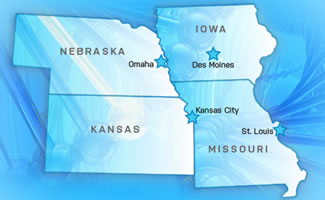
Civic leaders from four Midwestern metros – Des Moines, Kansas City, Omaha and St. Louis – are partnering to develop strategic, coordinated actions that strengthen the Heartland’s competitiveness in the global economy.
The Heartland region shares a common life sciences economy, including human, animal and plant sciences. To better understand the specific life sciences assets available, the Heartland Civic Collaborative launched a four state life sciences asset mapping project in September of 2014. St. Louis-based Rubin Brown was selected to conduct the study, which was completed in late 2015.
The study identified 791 life sciences companies at 976 locations in the four-state region. Of the 791 life sciences companies, 60 percent are focused on human health, 15 percent on agribusiness, 15 percent on animal health, 5 percent on plant sciences, and 5 percent on energy. Sales data from about half of the 791 companies totaled $28.5 billion in 2014. Additionally, the report identified 389 university research institutes, centers and core technology laboratories in the four-state region, allowing identification of complementary research expertise in each state eligible for future collaborations. The report also found that employment in life sciences companies is conservatively estimated at 82,800, not including the hundreds of jobs within research universities.
The data compiled through the life sciences asset mapping project allows our region to:
- Target company recruitment to identify life sciences sub-sector strengths.
- Inform strategy development guiding economic development activities.
- Provide intelligence to enhance academic-industry partnerships for faster, more efficient commercialization of new innovations.
- Establish and expand company networks within sub-sectors.
- Enhance opportunities for scientists to establish inter-institutional collaborations.
- Provide data regarding the life sciences industry to effectively engage local, state and federal legislators.

This project brought together a unique group of stakeholders, including the Biotechnology Industry Organization chapters in each state (BioKansas, BioNebraska, Iowa Biotechnology Association, and Missouri Biotechnology Association); civic and science organizations (BioSTL, Civic Council of Greater Kansas City, Greater Des Moines Partnership, Greater Omaha Chamber of Commerce, Kansas City Area Life Sciences Institute, Missouri Technology Corporation), and the Pharmaceutical Research and Manufacturers of America Association.